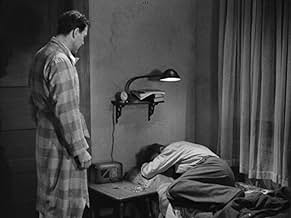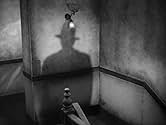In 1946, Olivia De Havilland donned monogram brooches and identity necklaces to take the dual role of good and bad twins Ruth and Terry in Robert Siodmak's The Dark Mirror. The following year Bonita Granville followed suit, as good and bad twins Linda and Estelle, in Monogram's sub-basement adaptation of a Cornell Woolrich story. Of the two, The Guilty is the creepier, more haunting movie, taking a place of dubious honor amid the nether reaches of film noir.
Mustachioed Don Castle shares his walk-up flat with his superior from army days, Wally Cassel, who's a little unstable owing to a head injury sustained in combat. They're involved in a complicated foursome with the twins; when one of the fellows breaks up with one of the girls, the other takes up with the ditched sister. But the insanely jealous Estelle keeps playing one guy off the other; she wants both and her sister to have neither. One night Linda disappears; later her body is found on a rooftop, in a barrel of gravel (she was too big to shove down the incinerator shaft). Police investigator Regis Toomey encounters a baffling maze of alibis and false clues (Castle is on the hunt as well), until the movie ends with climaxes within climaxes.
All this takes place in but three sleazy sets: The men's apartment; that of the twins, their mother and a long-time boarder (John Litel); and a corner bar from which most of the story is narrated in flashback. A few forays into the dark, deserted streets only enhance the claustrophobia, the obsessiveness of Woolrich's nightmare vision. (And his obsessive fiction reuses the same themes and gambits over and over; there are parallels here to the same year's The Fall Guy, which resembles The Black Angel, which...).
Granville, of course, will ever be the screen embodiment of Nancy Drew, from the four programmers she starred in as the teenaged sleuth during the late '30s. Her career started to sputter in the next decade; for one thing her girlish exuberance didn't blossom into womanly glamor. But she developed a tough, no-nonsense, very-'40s face (not unlike Ann Savage's). Her noir appearances were limited to a small (but meaty) role in The Glass Key and a leading one in the low-budget Suspense. It's a shame, because grew up into quite a good bad girl.































